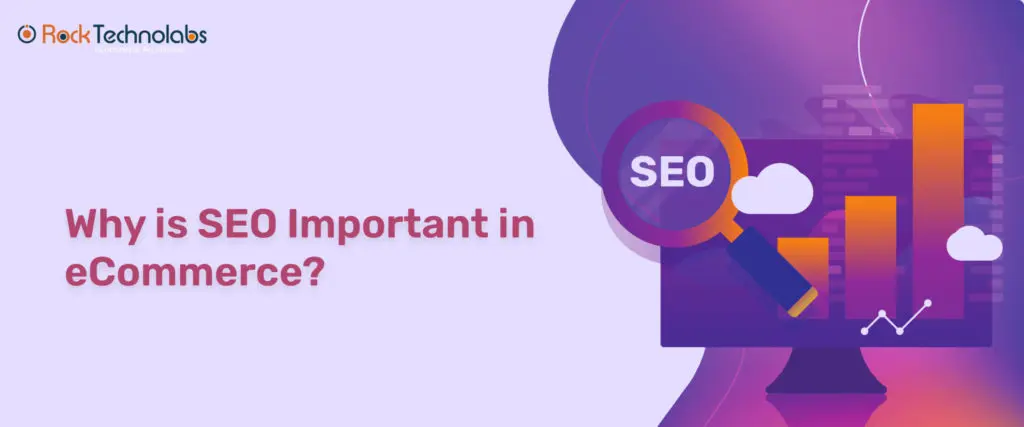What is eCommerce SEO, and Why is it Important?

Visitors are essential to the success of an online store. For your e-commerce business to grow, you need to attract more customers, whether you have just launched or been around for a while. A website with more traffic and higher quality will likely generate more sales as compared to a website get less traffic.
Ethical SEO, also known as the Search Engine Optimization is the best strategy for generating higher-quality leads for your website, as it creates a pipeline for organic visitors. According to a study, search engines account for 53% of the traffic to eCommerce sites.
SEO is the most effective marketing strategy in this competitive digital commerce world, and the results it produces last for a longer period.
In this blog, we will explain what e-commerce SEO is and the Importance of SEO in eCommerce in boosting search engine rankings.
What is eCommerce SEO?
Ecommerce SEO is simply a process of optimizing your online ecommerce store to get more visibility and increase the ranking on web.
It allows your store to appear at the top of SERP (Search Engine Result Pages), which usually appears alongside the paid ads or google shopping ads.
The more your site ranks higher, the more traffic your website gets. Nonetheless, sales and conversion depend upon many factors, including a highly appealing user experience.
What is the importance of SEO for e-commerce stores?
Why SEO for e-commerce? New customers and repeat customers are the lifeblood of e-commerce stores. Growing your store is easier with new buyers. Increased revenue and profits can be achieved through SEO.
Also Read: SEO Tips For Your Magento 2 Store
Increasing the lifetime value of your online buyers is possible with SEO, as it enables you to gain their trust and confidence. Let’s see why it is important for your commerce website.
Improve the quality of leads.
Along with increasing site visitors, SEO can also prequalify leads for e-commerce. E-commerce sites often receive clicks from consumers who need more time to purchase or have doubts about your store’s quality. They need more than clicking on your product pages to get that info.
Increase organic traffic to your e-commerce site.
Getting organic traffic from search results is how you get visitors to your website. The traffic comes from people searching on search engines and finding your website there. As a result, you receive clicks from these ideal customers.
SEO makes your site rank higher in search engine result pages, increasing the number of clicks from search engines.
Sets you apart from the competition.
To gain an advantage over your competitors, ensure your website is user-friendly, and your content answers the user’s questions.
Reaching a wider audience
By increasing traffic to your web store, e-commerce SEO helps your brand grow. With paid retargeting campaigns, users can be contacted again after organically visiting your website. Remarketing using SEO is highly effective.
Rank organically for relevant search terms and establish brand authority to differentiate yourself from your competition For this you can contact ecommerce seo agency.
Credibility is better
Consumers and brands trust high-quality websites, and businesses with a long history are more trusted by consumers.
Developing an eCommerce SEO strategy involves the responsiveness of a business’s website, publishing quality content, eliminating spam links, and using social media to promote the business. These activities lead to establishing credibility and gaining the customer’s trust.
E-commerce SEO helps you target customers with certain needs.
By utilizing e-Commerce SEO, businesses can reach potential customers searching for their products online. Brands that invest in e-commerce SEO are more likely to attract high-quality traffic since they target customers already looking for what they are selling.
In other words, organic search results not only increase revenue directly (by assisting customers in finding relevant information faster), but they also reduce the number of resources spent on customers who do not require your services.
Growth on a long-term basis
The investment in SEO for e-commerce should be made over a long period. Indeed, SEO often takes longer than paid search campaigns to produce results, but the return on investment is significantly greater.
A high-quality website with positive rankings and user-friendly content provides value for many years.
Rank your product pages better by optimizing them.
There are many aspects of a product page that require attention, which makes it an interesting page. The finest e-commerce SEO techniques can be applied to your product pages by including structured data.
In most cases, a search result providing a full product description will appeal more to your ideal customers, along with its ratings and reviews.
Make remarketing more effective
Using paid search in conjunction with search engine optimization can help you gain insight into the visitors to your website. Using e-commerce SEO to drive high-quality traffic to your website may lead to the creation of larger remarketing audiences.
As part of your remarketing strategy, it will be possible for you to assist your target audience in gradual conversion preparation. With SEO, more interested visitors can be attracted to your product pages, giving you a bigger and more relevant audience to market to.
Getting the sales funnel filled
With SEO driving relevant traffic to your site, how will you handle the influx of visitors? Of course, you should include it in your marketing pipeline!
In addition to generating leads, search engine optimization can funnel the most conversion-oriented leads. Furthermore, you will gain insight into how to reach your target audience based on their likes and dislikes.
Three Key Benefits of Implementing SEO Strategies For eCommerce Store
The benefits of SEO for eCommerce businesses are endless. SEO can help you understand your target market better in the long run.
Rankings will only improve after a while, and you must wait before seeing results. Boosting traffic, sales, and overall ROI can be achieved by creating high-quality content and engaging users with your online presence.
Let us uncover some of the impressive benefits eCommerce SEO brings into play:
Visibility on the Internet
SEO improves your site’s placement near the top of search engines that facilitate your store to consequently get more publicity online, getting more traffic and recognition.
Cost reductions in marketing
With regard to paid advertising methods such as pay-per-click (PPC) and cost-per-impression (CPM), SEO is a relatively inexpensive marketing method that can significantly increase your company’s sales. An investment in SEO can result in long-term results for your eCommerce business at an affordable cost, thus contributing to the success of your business.
Advance The User Experience
Customers are known to abandon websites that take more than 3 seconds to load from search results. You must optimize the user experience (UX) with page speed insight tool. When your visitors have an intuitive and seamless experience on your website, it increases engagement, decreases bounce rates, and increases conversion rates. Several studies have proved the importance of UX in e-commerce SEO.
How to Create a Strategy for Your E-commerce SEO ?
We have now discussed eCommerce SEO and its importance, but how do we develop our strategy? If you operate an established store with many products to track, SEO may appear overwhelming.
Developing an eCommerce SEO strategy takes time, money, and effort. However, the rewards of a well-constructed strategy far outweigh their costs. Where should you start when deciding how to develop a strategy for eCommerce SEO?
Create a workflow first
Optimizing a website for search engines requires much intention and concentration. Remembering this, you should know that SEO requires you to meet several objectives and requirements. In addition to choosing keywords, including metadata, naming images correctly, and so on, there are many other things to consider.
Page Priority
Start by determining which pages receive the most traffic. First and foremost, these pages must be optimized because visitors will likely see them as soon as they arrive at your site.
Keep an eye on your competitors
To outshine your competition, eCommerce SEO must greatly influence your overall strategy. Knowing what your top competitors do can help you get this done. Look at their sites, analyze them, then develop a strategy.
What should be included in an e-commerce SEO strategy?
To maximize your website’s ranking in top search engines, e-commerce retailers need to be aware of these critical SEO components:
Keyword Research
Search engine optimization strategies begin with keyword research. A successful search engine optimization strategy involves understanding what people search for when they find their business on a search engine.
On-page Optimization:
You should optimize your content to rank for your desired search terms, including your URL, heading tags, content body, meta description, and meta title.
Setup of the technical infrastructure (Technical SEO)
It is essential to optimize the technical part of your web store: such as making it HTTPS, mobile-friendly, user experience, canonical, page speed, indexation, navigation, sitemap, and so on.
Off-Page SEO:
Your store’s ranking can be improved by obtaining backlinks from relevant websites. Generating quality backlinks is necessary to build the authority.
Start Implementing Ecommerce SEO to Get More Traffic and Sales!
In today’s competitive world, you cannot ignore the importance of SEO in eCommerce. eCommerce SEO plays an essential role in the success of your eCommerce store. By implementing the right SEO strategy, you can take your eCommerce business to success.
Want to optimize overall performance and user experience of your store? we can help!


